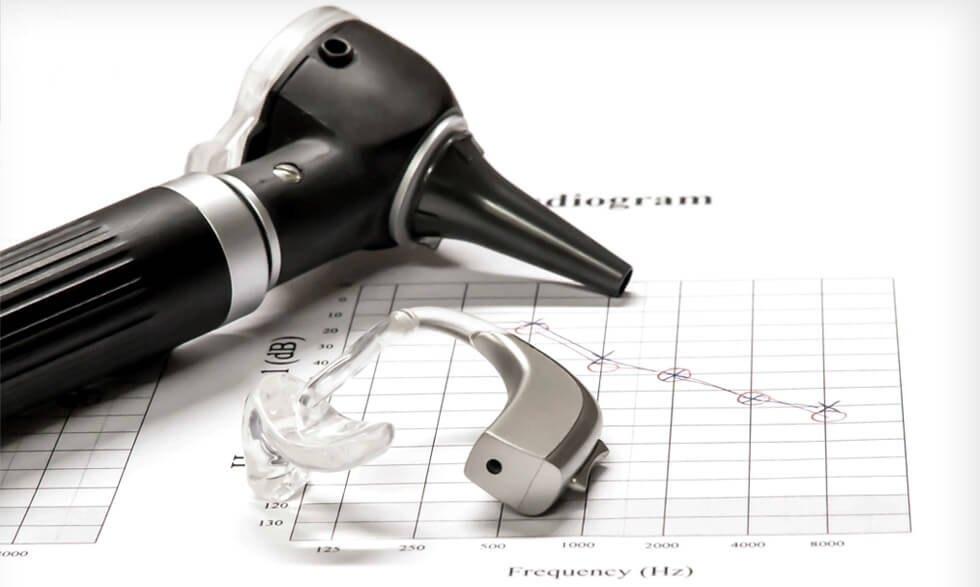"What's that you said?"
Perhaps you've heard yourself say those words more often than you'd like to admit. Or maybe you, a family member, or a friend is consistently turning up the TV volume or can't follow simple conversations in restaurants.
If you are age 70 or older, this is common. Mild-to-moderate hearing loss affects more than 60 percent of 70-year-olds, and more than 80 percent of 80-year-olds have hearing loss, according to NIH's National Institute on Deafness and Other Communication Disorders (NIDCD).
Hearing health care affordability and accessibility is an urgent public health problem. Nearly 37.5 million adults in the U.S. report hearing loss in one or both ears. This number is rising as the number of senior citizens increases.
"Hearing loss is a hidden disability that usually occurs gradually over time, so it's often hard to know how much hearing loss you have or how much you're missing," says Debara Tucci, M.D., of Duke University.
An NIDCD-funded researcher, Dr. Tucci specializes in ear surgery and health care for people with hearing disorders. She says that if hearing loss is not treated, it can result in serious health, social, and financial problems.
"People with hearing loss have a higher risk of falls, depression, and hospitalization. They also have more difficulties accessing health care," Dr. Tucci says. Hearing loss has also been associated with a higher risk of social withdrawal and dementia in older adults.
Of the millions of adults who could benefit from hearing aids, only 25 percent has actually used one, according to NIDCD.
Social stigma
There are many reasons why people with hearing loss don't use hearing aids. One reason is that there is a stigma associated with them.
"People often see hearing aids as a sign of being old, so they avoid getting the help they need," Dr. Tucci says. Before seeking medical treatment, most hearing aid users have lived with hearing loss for more than 10 years, and their hearing has become worse over time.
Hearing aids, provider visits, and other hearing care treatment can also be very expensive. Medicare and Medicaid offer limited to no coverage for hearing aids, which can cost up to $3,000 per aid.
Affordability and accessibility
Why the high cost? In most cases, the price of the hearing aid includes the services of a hearing health professional.
Currently, if you think you need hearing aids, you must first visit an audiologist or hearing instrument specialist to be tested. You would then purchase the devices from one of these hearing health providers, who would fit you for the hearing aids and adjust them for your needs. They might also counsel you and family members about how to adjust to hearing loss.
Audiologists are health care providers with advanced degrees who have special training in hearing and balance disorders. Hearing instrument specialists are state-licensed professionals. The requirements vary among states; most states require completing a two-year apprenticeship.
As hearing aids have moved from analog to digital components, the options for different settings have expanded substantially. In addition, the settings on the hearing aids can be adjusted more easily. In some cases, the user can adjust the settings.
Researchers have been exploring why many people don't get the help they need and whether there are ways to ensure that more adults with mild-to-moderate hearing loss get hearing health care.
"The NIDCD has a long history of research and discovery in hearing health," says NIDCD Director James F. Battey, Jr., M.D., Ph.D. "We support studies not only on how we hear, but also on technologies to help people hear better and on delivery models to get hearing loss interventions into the hands of the people who need them."
One study recently found that participants who selected pre-programmed hearing aids using an over-the-counter delivery model reported a similar level of benefit as participants who purchased the same hearing aids through an audiologist following best practices.
The audiology services included fitting the hearing aids and counseling the consumers on how to use them. The study is the first randomized, double-blind, controlled clinical trial to compare the effectiveness of two service-delivery models of hearing aids.
Larry Humes, Ph.D., professor of speech and hearing sciences at the University of Indiana, is the lead researcher on the study. "I'm excited about the research results," Dr. Humes says. "I'd like more hearing aids to be available to consumers."
On August 18, 2017, a new law was established that will provide more options for some adults with hearing loss. The law gives the Food and Drug Administration (FDA) three years to create standards for safety, effectiveness, and labeling of over-the-counter hearing aids. This new law was a provision in the FDA Reauthorization Act of 2017.
Over-the-counter hearing aids would be FDA-approved for adults with perceived mild-to-moderate hearing loss. Consumers would not need to see licensed hearing professional to purchase certain hearing aids.
Advocates of the law expect the cost of the hearing aids will be much lower than hearing aids sold through current service delivery models.
FDA is developing language to help consumers determine if they are a good candidate for these devices, or if they have symptoms that suggest that they should see a health care professional.
"Over the counter is a good option for people who think they have hearing loss," says Dr. Humes. "It's an affordable way for people to try out the hearing aids at low cost. As their hearing needs become more complex, they may then go to a professional to get more assistance."
Beyond hearing loss
Using hearing aids to improve hearing is not as simple as putting on a pair of reading glasses to see better.
"People think they can just use a hearing aid and they will have 20-20 hearing, like they do with eyeglasses," says Dr. Humes. "The problem with older adults and hearing loss is a little more complex."
It takes weeks or months to get used to the louder sound from hearing aids. And treating a hearing problem involves adjustments for the inner ear and the brain. "The convenience of over-the-counter hearing aids is good, but older people must not have expectations that they will hear like a 20-year-old again as soon as they put on their hearing aids," Dr. Humes says.
Adults with perceived mild- to-moderate hearing loss are encouraged to check out low-cost hearing care options when they become available. And, if you are over 65, a visit with an audiologist should be within reach.
"I encourage everyone over age 65 to see their primary care doctor and get a referral to an audiologist for a hearing test, which is covered by Medicare," advises Dr. Tucci. "This is the best way to determine if you have hearing loss and to prevent other health issues related to hearing loss."





